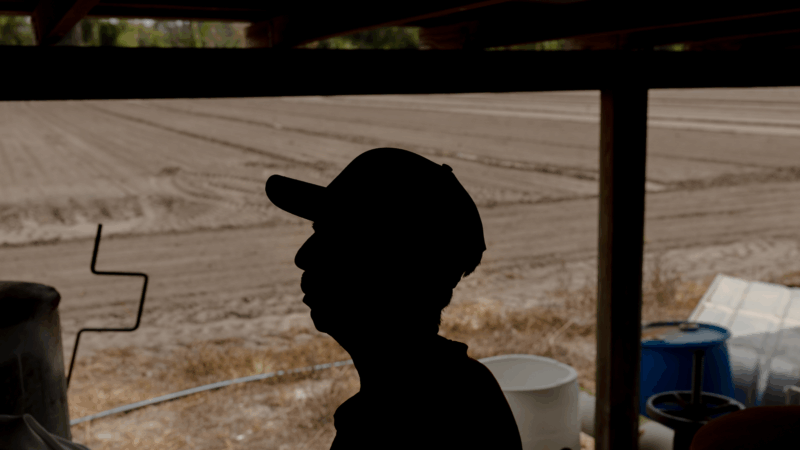Some Florida farmers reduce crops as deportation fears drive workers away
The man looks out at the empty field, squinting: It’s midday and the Central Florida sun is intense. To the untrained eye, this looks like a large dry plot of land. But it’s one of the most important stages of strawberry farming: preparing the soil for planting so that by next spring, this field is bursting with juicy berries.
He’s been farming this land since the 1980s, but “things changed, almost overnight,” he laments.
President Trump’s immigration policies, including mass detentions and deportations, have dealt him a crippling blow, he says.
“The government is killing farming,” he says. “This is going to end us.”

F. is an immigrant himself, and asked to be referred to only by his first initial because he’s afraid of retaliation for criticizing the administration’s crackdowns, which are happening all over the state: Florida Gov. Ron DeSantis is actively deploying the highway patrol and local police in the effort.
“You just never know where agents are,” F. says, lowering his voice, even though no one is around. And as a farmer, that has meant having to reduce his workforce by nearly half.
“A lot of the migrants have left,” he says. “The rest are hiding.”

In a typical year, about half his workforce is without legal status. The other half usually come through an agricultural visa called the H2A. But this year, F. is taking no risks: He’s not hiring any strawberry pickers who are in the U.S. illegally.
But he says he can’t afford to hire more H2A visa workers — the costs have been going up for years. “I’m drastically cutting down production next year,” he says, “to 35% of what I usually do.”
Economists have warned that Trump’s ongoing deportation campaign will hurt the U.S. economy, especially sectors that rely on migrant labor. Just in the last four months, agricultural employment has fallen by 155,000 workers, the biggest dip in nearly a decade.
Earlier this year, President Trump himself voiced the need for flexibility on immigrants working in agriculture. “Our farmers are being hurt badly,” he said at a news conference in mid-June. “They have very good workers, they’ve worked for them for 20 years. They’re not citizens, but they’ve turned out to be great. We can’t take farmers and take all their people.”

That was more than two months ago. As yet, there’s been no policy shift. In fact, since then, members of his Cabinet have consistently pushed for a hard line. “The president has been unequivocal that there will be no amnesty,” asserted Agriculture Secretary Brooke Rollins in early July. “Ultimately, the answer to this is automation. And then also when you think about it, there are 34 million able-bodied adults in our Medicaid program. There are plenty of workers in America,” Rollins said.
Farmers NPR spoke to called this idea ludicrous. Many said they are paying well above the minimum wage, and yet they have gotten few American-born job applicants. John Walt Boatright, director of government affairs at the American Farm Bureau, said he would remind folks that in order to apply for an H2A visa, farmers must post their labor needs to give American workers a fair chance to apply for the job. “The interest and the willingness to work on farms has not been there,” he says. “It hasn’t been there for a long time.”
Boatright says there needs to be an urgent fix to the H2A visa system. The Farm Bureau would also like to see a pathway to legalization for farmworkers here illegally.
That’s something many in Florida’s agricultural sector support.
“I think the American consumer ought to be concerned about food being a national security issue,” says Jeb Smith, president of the Florida Farm Bureau Federation. “Anytime that there is a threat to not getting a safe, affordable and abundant food supply, it should be concerning to the American public. We do not want to be dependent on foreign countries for our food. That could be a very devastating reality. That is a dangerous thing to dabble with.”

Smith says his top priority is capping costs of the H2A visa. He stops short of calling for a pathway to citizenship for immigrant workers, but says: “There is a concern about some of our workforce just not being able to function at full capacity. That’s something we need to be very cognizant of. When it comes to deportation, I’m confident most farmers in our country agree we want a safe border, but we need a good workforce, and we need it legal.”
Farther west, deeper into Central Florida’s agricultural area, Trump flags sit still in the humid heat, and mailboxes adorned with MAGA stickers stick out on the rural roadways.
One strawberry farmer agrees to talk, but only if we use his initial only: W. In this deeply pro-Trump area, he worries that criticizing the president could cost him business.

As we sit in the shed to get some reprieve from the sun, he tells us he fully supports the president, but he’s worried about the future of his farm. W. says he wants two things: lower fees for the H2A visa and a path to legalization for workers. “They need to come up with like, letting these ones who’ve been here for 15-20 years going in and doing their papers right,” he says. “I mean, they been here, raised their families. I know there’s some bad seeds out there. But there’s bad seeds everywhere.”
Lowering his voice almost to a whisper, he says that on immigration, Gov. DeSantis and President Trump “might be riding them a little bit hard.”
If you have immigration tips, you can contact our tip line, on WhatsApp and Signal: 202-713-6697 or reporter Jasmine Garsd: [email protected]
Correction: A previous version of this story incorrectly said the American Farm Bureau advocates for a “path to citizenship” for migrant farm workers, The bureau advocates for a “path to legalization.”
‘Bomb cyclone’ forecasted to bring heavy snow, blizzard conditions and dangerous travel
A 'bomb cyclone' is intensifying severe winter weather for millions of people across the U.S. The system is expected to knock out power and disrupt holiday travel.
Russia sends 3 Iranian satellites into orbit, report says
The report said that a Russian rocket sent the satellites on Sunday from a launchpad in eastern Russia.
Viral global TikToks: A twist on soccer, Tanzania’s Charlie Chaplin, hope in Gaza
TikToks are everywhere (well, except countries like Australia and India, where they've been banned.) We talk to the creators of some of the year's most popular reels from the Global South.
This painting is missing. Do you have it?
An important work from a rediscovered artist has been absent from public view since the 1970s. A New York curator is hunting for it.
Memory loss: As AI gobbles up chips, prices for devices may rise
Demand for memory chips currently exceeds supply and there's very little chance of that changing any time soon. More chips for AI means less available for other products such as computers and phones and that could drive up those prices too.
Brigitte Bardot, sex goddess of cinema, has died
Legendary screen siren and animal rights activist Brigitte Bardot has died at age 91. The alluring former model starred in numerous movies, often playing the highly sexualized love interest.








